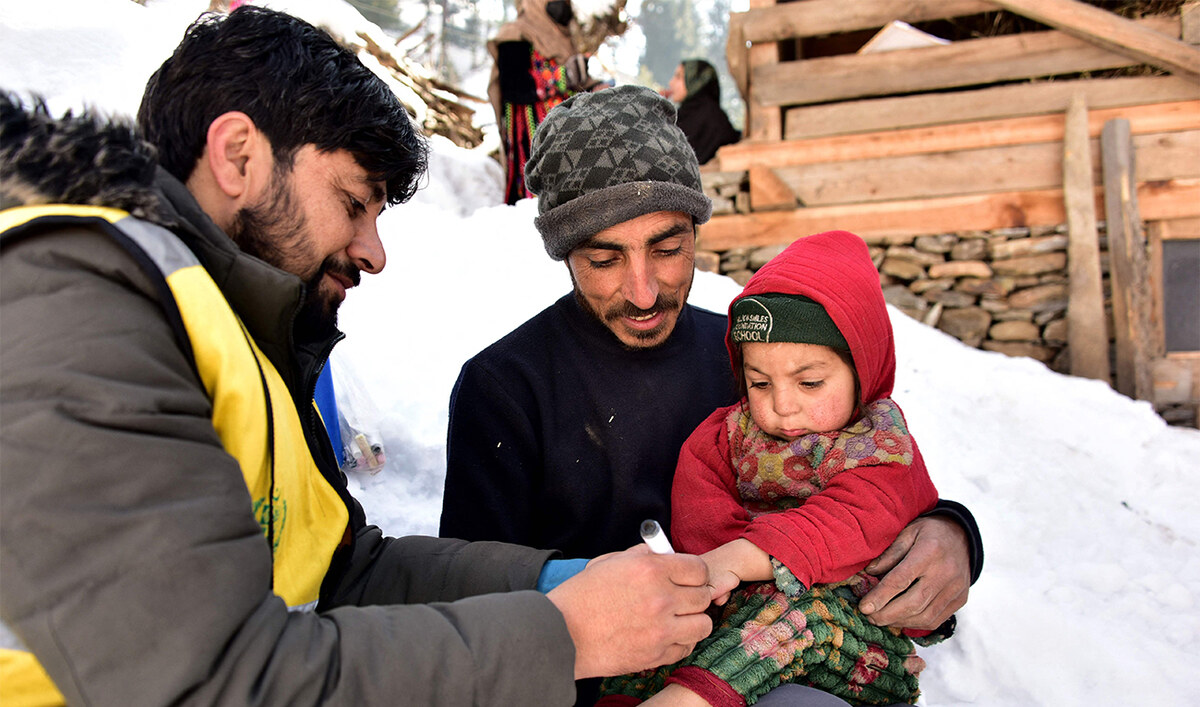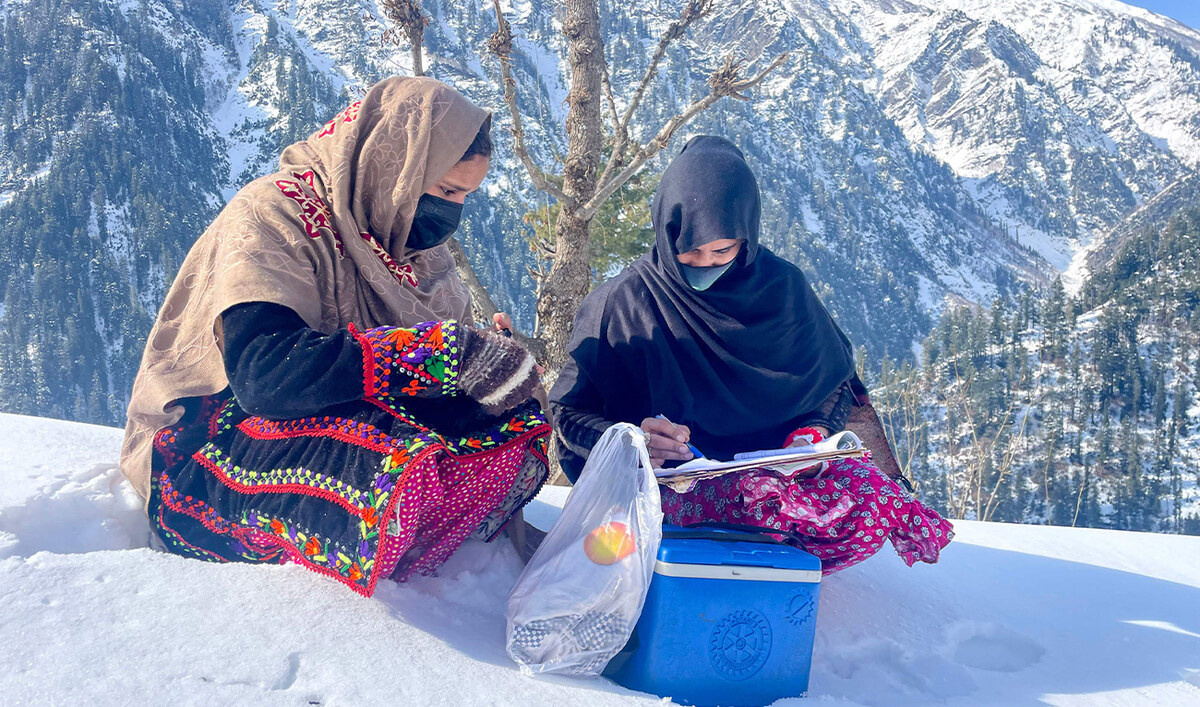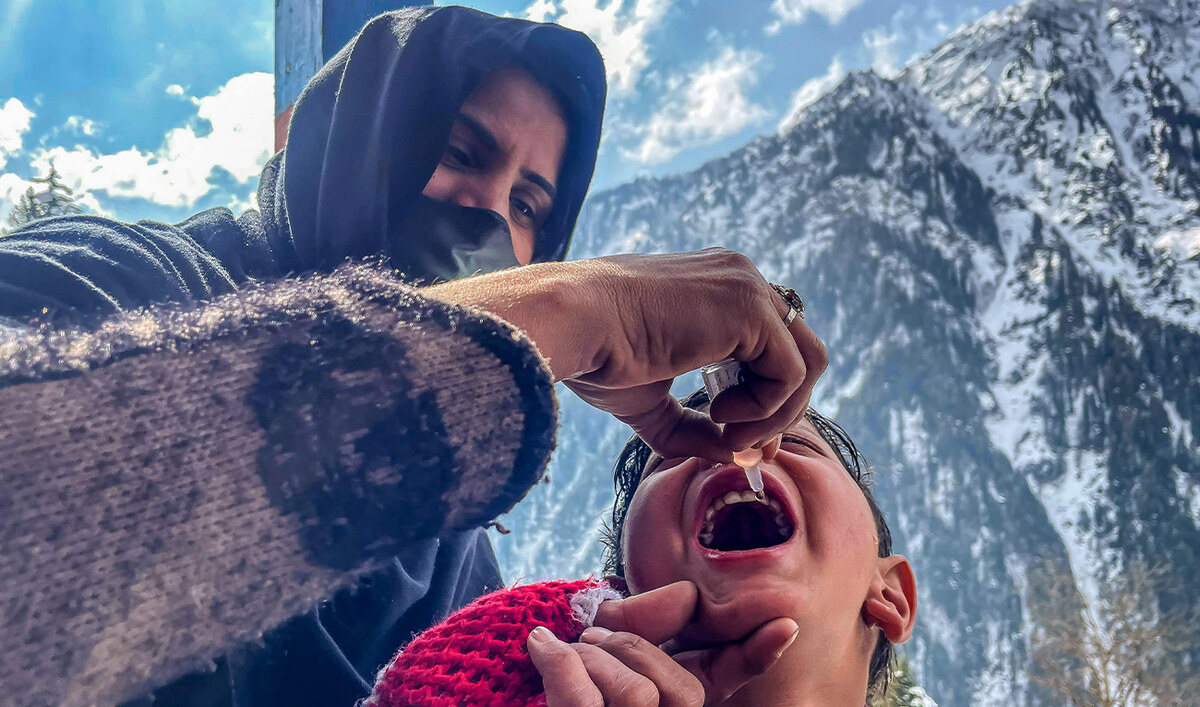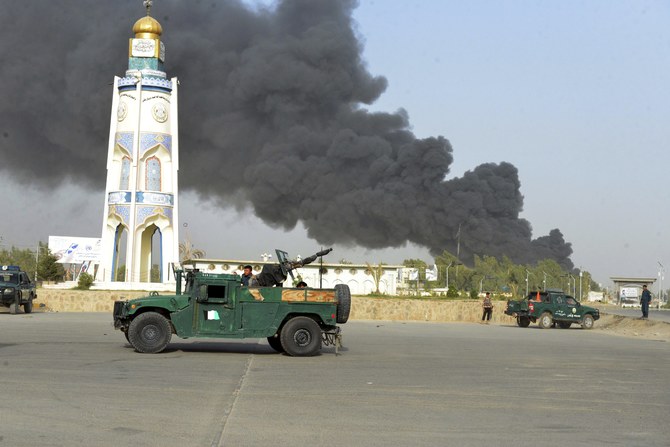KABUL: At least 12 people were killed and 60 wounded on Thursday after Taliban fighters struck a gate outside police headquarters in the Afghan city of Kandahar on Thursday, police and government officials said.
The attack comes as Taliban and Afghan representatives, including some government officials, agreed earlier this month to a basic road map for negotiating the country’s political future, a major step that could help propel peace efforts to end the long war, now in its 18th year.
The Taliban said in a statement their fighters had detonated two car bombs and entered the police offices in Kandahar, the former seat of the Taliban when they ruled Afghanistan from 1996 until they were ousted by a US-led coalition in 2001.
Tadeen Khan Achakzai, the police chief for Kandahar, said insurgents had used a “car bomb” to strike the main police station of the province while Kandahar’s governor, Hayatullah Hayat, told reporters 12 people, including civilians, were killed in the attack and 60 more were wounded.
Thick plumes of smoke could be seen rising from the site of the attack, caused by the first blast which the Taliban said was a suicide bombing. Several more explosions were heard later after at least three Taliban fighters managed to make their way into the compound, witnesses said.
Experts say after a lapse of many months, the Taliban had once more become active in Kandahar and had managed to conduct a series of bloody attacks in recent months there. The Taliban also killed at least 30 commandos in one single attack in the southwestern Badghis province, one of the deadliest single incidents for the force.
However, according to local and foreign estimates, even more civilians have been killed in pro-government raids in the past two weeks, sparking protests against the government.
Taliban and government forces have also suffered casualties in battles in various parts of the country.
A Taliban infiltrator on Wednesday killed one government general in Ghazni province while the head of guards protecting President Ashraf Ghani’s personal residence, another general, succumbed to his injuries in an explosion in his car in Kabul.
A Swedish aid group recently shut down over 40 of its medical clinics in Wardak province after it said the Taliban had ordered them to do so.
The meeting of Afghans and the pledge of the two main warring sides in Qatar, following seventh rounds of talks between the Taliban and US diplomats, has raised hope of reduction of violence, now dampened by recent attacks.
US and Taliban officials are expected to resume talks in the near future, with the withdrawal of US-led troops from Afghanistan being a main sticking point in the discussion.
Taliban attack on police headquarters kills 12 in Afghanistan’s Kandahar
Taliban attack on police headquarters kills 12 in Afghanistan’s Kandahar

- Taliban said in a statement their fighters had detonated two car bombs and entered police offices
- Insurgents have managed to conduct a series of bloody attacks in Kandahar in recent months
UN agencies express concern over Pakistan’s directive for Afghan nationals to leave capital

- UNHCR and IOM say forced return of Afghans to their home country can place them at increased risk
- They say Pakistan has arrested over 800 Afghan nationals from Islamabad and Rawalpindi since Jan. 1
ISLAMABAD: The United Nations Refugee Agency (UNHCR) and the International Organization for Migration (IOM), which operates under the UN system, on Wednesday voiced concern over Pakistan’s directive requiring Afghan nationals to relocate from Islamabad and Rawalpindi or face deportation, urging authorities to consider human rights standards in implementing the policy.
Last year, the Pakistani government announced that Afghan citizens residing in the federal capital would require No Objection Certificates (NOCs) after saying that many of them participated in an anti-government protest launched by former Prime Minister Imran Khan’s opposition Pakistan Tehreek-e-Insaf (PTI) party.
The development came months after Pakistan launched a deportation drive, citing security concerns, with officials arguing that Afghan nationals had been linked to militancy. However, the Taliban-led administration in Kabul contended that Afghan refugees were being scapegoated and insisted they were not responsible for Pakistan’s security issues.
The UNHCR and IOM said Pakistani authorities have arrested and deported over 800 Afghan nationals from Islamabad and Rawalpindi since January 1, including women and children, further raising concerns among humanitarian organizations. They said they were seeking clarity over the modality and timeframe of Afghan relocation.
“Pakistan has a proud tradition of hosting refugees, saving millions of lives,” Philippa Candler, the UNHCR representative, noted. “This generosity is greatly appreciated.”
“Forced return to Afghanistan could place some people at increased risk,” she added. “We urge Pakistan to continue to provide safety to Afghans at risk, irrespective of their documentation status.”
A UNHCR-issued non-return advisory has been in place since 2021, calling for a suspension of forced returns of Afghan nationals from any country, regardless of their status.
UNHCR and IOM have emphasized the need for a mechanism to register and screen Afghan nationals in Pakistan to provide tailored solutions, including international protection for those in need and legal pathways for individuals with strong socioeconomic and family ties in the country.
“IOM is committed to work with the Government of Pakistan and UNHCR to develop a mechanism to register, manage and screen Afghan nationals in Pakistan,” said IOM Chief of Mission, Mio Sato. “This will open the door to tailored solutions, including international protection to those in need and pathways for Afghan nationals, with long-standing socioeconomic and family ties in the country.”
Pakistan’s Zardari says militants can’t derail China ties, discusses cooperation with Xi

- Zardari acknowledges ‘ups and downs’ in Pakistan-China ties amid shared security concerns
- Chinese president says Beijing is committed to working with Pakistan for greater modernization
ISLAMABAD: President Asif Ali Zardari said on Wednesday militant attacks will not undermine Pakistan’s ties with China, as the two countries pledged to move forward on the next phase of the multibillion-dollar China-Pakistan Economic Corridor (CPEC).
Zardari issued the statement during his meeting with Chinese President Xi Jinping at the Great Hall of the People in Beijing, where both leaders discussed security issues and economic cooperation.
The interaction came amid increasing concerns in Beijing over the security of its workers in Pakistan, many of whom are involved in CPEC infrastructure projects and have been targeted in a series of attacks in recent years.
Despite acknowledging that his country’s friendship with China had “gone through ups and downs,” the Pakistani president said it would not be broken down by militant attacks.
“Pakistan and China will always be friends, all-weather friends,” he said at the opening of talks with Xi. “No matter how many terrors, how many issues crop up in the world, I will stand, Pakistani people will stand with the people of China.”
According to an official Pakistani statement released after the meeting, the two leaders discussed the high-quality development of CPEC 2.0, which aims to expand beyond infrastructure to include other areas.
Initially launched in 2013 as part of China’s Belt and Road Initiative (BRI), the first phase of CPEC focused on transport infrastructure, energy projects and the development of the Gwadar Port.
The next phase, dubbed CPEC 2.0, seeks to emphasize industrialization, agricultural modernization, and partnerships with third countries to enhance regional connectivity and economic growth.
Both leaders emphasized people-to-people exchanges and cultural linkages as key elements of strengthening the China-Pakistan community of shared future in the new era.
President Xi also acknowledged that China and Pakistan have an enduring friendship and have set a model for relations between two countries by advancing the construction of CPEC and cooperation in various fields.
A Chinese-funded $230 million airport, the largest in Pakistan, started operations last month in the coastal city of Gwadar in Balochistan province, where a separatist group has launched multiple attacks targeting many groups including Chinese.
A shipping port in Gwadar is the end of the envisioned economic corridor, which would cross the length of Pakistan to link the western Chinese region of Xinjiang with the Arabian Sea.
“The Chinese side is willing to work with the Pakistani side to move forward hand-in-hand on our respective paths of modernization,” the Chinese president said.
The start of operations at the airport was delayed from last year after a surge in attacks in Balochistan.
Zardari also extended an invitation to Xi to visit Pakistan, highlighting the strong public admiration for the Chinese leader in Pakistan.
Following the meeting, both presidents witnessed the signing of memorandums of understanding (MoUs) to boost cooperation in science and technology, clean energy, socio-economic development, and media collaboration.
The event concluded with a state banquet hosted by President Xi in honor of the visiting Pakistani delegation.
-With input from AP
Pakistan health workers kick off polio drive despite snow in Kashmir

- There has been no polio case in the mountainous Himalayan region of Kashmir for 24 years
- Pakistan recorded at least 73 polio cases in 2024, a sharp increase from six cases a year before
SURGAN, Pakistan: Health workers are braving freezing temperatures this week to administer polio vaccinations in Pakistan-administered Kashmir after cases surged nationwide last year.
Pakistan and neighboring Afghanistan are the only countries where polio is endemic, and militants have for decades targeted vaccination teams and their security escorts.
A police officer guarding polio vaccinators in the northwest was shot dead by militants on Monday, the first day of the annual campaign that is due to last a week.
In Kashmir, health worker Manzoor Ahmad trudged up snowy mountains as temperatures dipped to minus six degrees Celsius (21 degrees Fahrenheit) to administer polio vaccinations in the region.
“It is a mountainous, hard area... we arrive here for polio vaccination despite the three feet of snowfall,” Ahmad, who heads the polio campaign in Pakistan-administered Kashmir, told AFP.

Social worker Mehnaz, who goes by one name and has been helping the vaccinators since 2018, said the difficult climate poses a huge risk to the vaccination teams.
“We have no monthly salary... we come here to give polio shots to the children despite the glaciers and avalanches,” she told AFP.
“We risk our lives and leave our children at home.”

The challenge is larger this year for the country with a population of 240 million, after it recorded at least 73 polio cases in 2024 — a sharp increase from just six cases the year before.
Health workers aim to vaccinate approximately 1,700 children within a week in the town of Surgan, around 150 kilometers (90 miles) north of Muzaffarabad, the capital of Pakistan-administered Kashmir.
“Our target is to give polio shots to 750,000 children below the age of five. There are 4,000 polio teams that visit house-to-house,” Ahmad said.

“There have been no polio cases in Kashmir for the last 24 years,” he added with pride.
Polio can easily be prevented by an oral vaccine, but in the past some conservative religious leaders have falsely claimed that the vaccine contains pork or alcohol, declaring it forbidden for Muslims to consume.
Pakistan and China agree to boost intelligence sharing in high-level security talks in Beijing

- Both nations share concerns over militant violence, particularly due to attacks on Chinese nationals in Pakistan
- The two countries also discuss border security and advancing high-quality development under CPEC projects
ISLAMABAD: Pakistan and China discussed security cooperation on Wednesday, agreeing to enhance intelligence sharing to address growing threats during a high-level meeting in Beijing, according to an official statement circulated by the interior ministry.
The two nations share concerns over militant violence, particularly due to attacks on Chinese nationals working on the multibillion-dollar China-Pakistan Economic Corridor (CPEC) projects in various Pakistani cities. Such incidents have prompted Beijing to call for enhanced security measures.
Last year, several Chinese nationals lost their lives in deadly suicide bombings, the most recent of which occurred in October 2024, killing two Chinese engineers near Karachi airport just days before the Shanghai Cooperation Organization Summit in the federal capital.
Pakistan’s Interior Minister Mohsin Naqvi, who is currently accompanying President Asif Ali Zardari on a five-day visit to China, met with his Chinese counterpart, Qi Yanjun, in Beijing to discuss concrete measures to bolster security and strengthen intelligence-sharing mechanisms.
“The meeting focused on improving intelligence coordination between the two countries,” said the official Pakistani statement.
It noted that discussions included an exchange on modern technology for police and paramilitary forces, as well as a detailed discussion on acquiring advanced equipment from China for law enforcement agencies.
The talks further covered border security cooperation, including measures to safeguard key routes and infrastructure projects. Both sides expressed a commitment to deeper collaboration in law enforcement and counterterrorism efforts.
Beyond security cooperation, the two countries are also working to establish special economic zones and encourage private sector partnerships to deepen economic ties. The development of these zones is a key component of CPEC, aiming to boost industrialization and economic growth in Pakistan.
President Zardari also met with Zhao Leji, Chairman of the Standing Committee of the National People’s Congress, to reaffirm the enduring friendship between Pakistan and China.
Both officials emphasized strategic mutual trust and discussed advancing CPEC’s high-quality development, focusing on cooperation in science and technology, renewable energy, infrastructure and agriculture.
Saudi cabinet approves memorandum of understanding with Pakistan to combat financial crimes

- The development signifies deepening strategic relations between the Kingdom and the South Asian state
- MoU was signed between Pakistan’s Financial Monitoring Unit and Saudi Department of Financial Investigation
ISLAMABAD: Saudi Arabia’s cabinet, chaired by Crown Prince Mohammed bin Salman, has approved a memorandum of understanding (MoU) with Pakistan’s Financial Monitoring Unit (FMU) to enhance cooperation in combating money laundering, terrorist financing and related crimes, the Saudi Press Agency reported this week.
Pakistan has faced significant challenges with money laundering and terrorist financing in recent years, leading to its placement on the Financial Action Task Force’s (FATF) grey list in June 2018.
After implementing comprehensive reforms to strengthen its financial system, the country was removed from the grey list in October 2022.
The FMU, established under the Anti-Money Laundering Act of 2010, serves as Pakistan’s financial intelligence unit, responsible for analyzing suspicious transaction reports and coordinating with international counterparts.
“[The cabinet approved] a memorandum of understanding between the General Department of Financial Investigation at the Presidency of State Security in the Kingdom of Saudi Arabia and the Financial Monitoring Unit in the Islamic Republic of Pakistan regarding cooperation in exchanging investigations related to money laundering, terrorist financing, and related crimes,” the SPA reported.
The MoU signifies the deepening strategic relations between Saudi Arabia and Pakistan. A significant Pakistani diaspora resides in the Kingdom, and numerous Pakistani businesses have established a presence there.
Saudi Arabia has been a key supporter of Pakistan’s economy, bolstering its reserves with substantial deposits in the State Bank of Pakistan and offering deferred oil payment facilities.
The Saudi cabinet also highlighted the Kingdom’s hosting of the INTERPOL Regional Bureau as a significant step, saying it underscored international recognition of the Kingdom’s pivotal role in combating extremism and other crime in their different forms.










